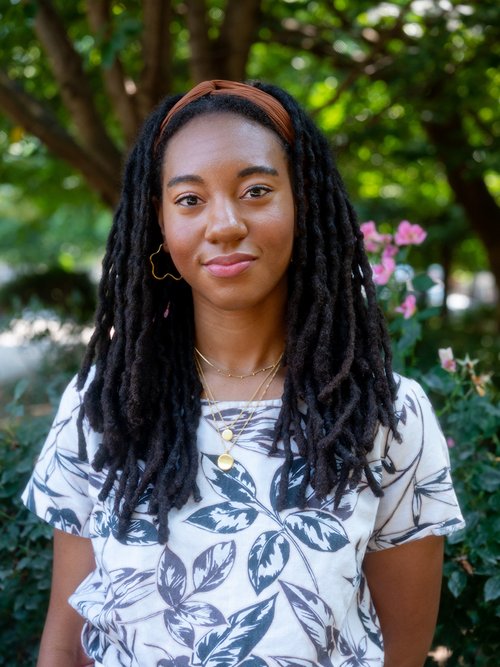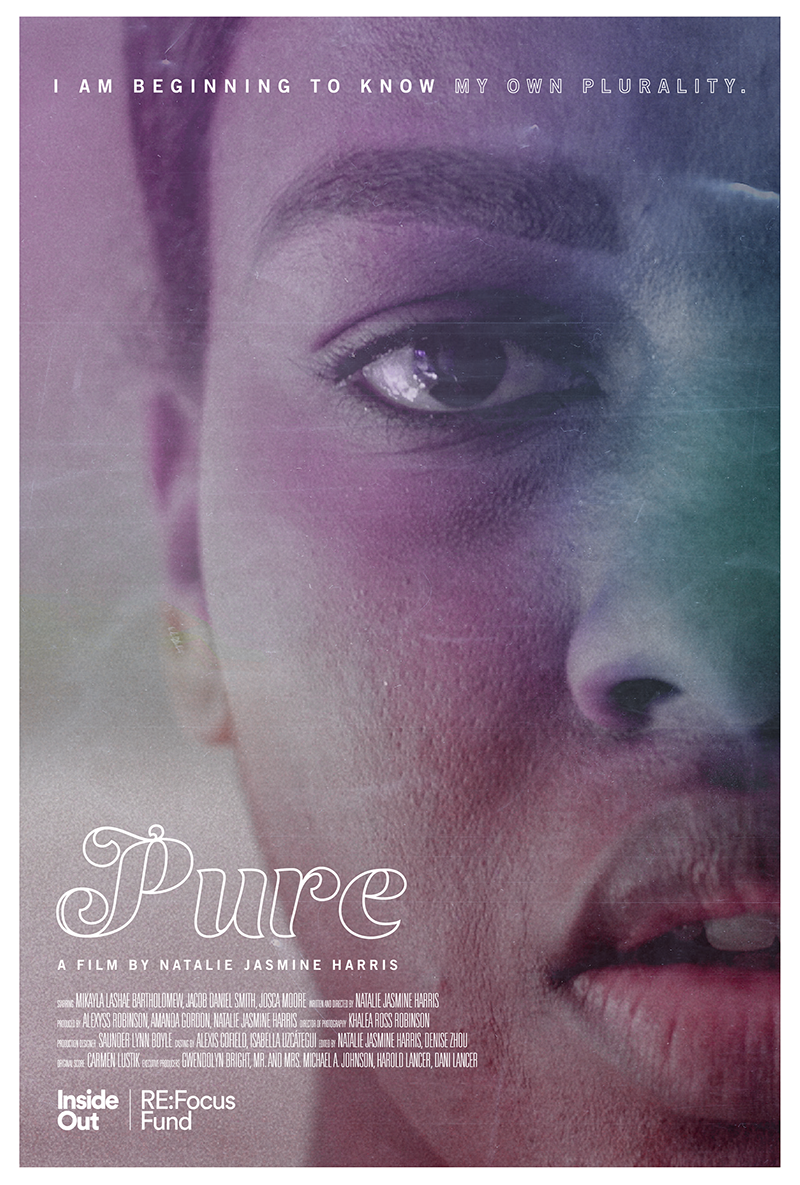Alex Manges: Just to kick us off, can you tell us a bit about what brought you to NYU Tisch?
Natalie J. Harris: My grandma actually went to NYU. She didn't go to Tisch but she went to college as an adult and I always just really admired her story of how education changed her life.
Growing up, I would often come visit her in New York City and just fell in love with the city itself. When it came time for me to apply to college, I ended up going to a different school in DC for my freshman year of college, but I transferred to NYU for sophomore year.
It was always a dream of mine to go to NYU for film school but also because of the special connection of going to my grandma's school.
AM: As a graduate of the class of 2020, you and your classmates had to leave school at an incredibly difficult time. Can you describe your experience, and the processes you developed to help you adapt?
NJH: It was definitely rough to graduate in 2020, and I still think it's been hard to be a recent graduate and try to figure out the landscape.
Honestly, I moved back home with my family right after everyone started leaving in March 2020, so I spent about 18 months at home with my family in Maryland. I don't really think I had a stable process, I really just spent a lot of time mourning the lost experiences.
When I had the motivation to, I would write and edit the short film and feature film scripts for Pure. After a while I got some confidence to start sending it out to different places and luckily things started picking up for me.
But in terms of a process, I don't really think I had a stable one because it was really a very unstable time, so it was very difficult honestly. Luckily, I was able to move back to New York just a couple of months ago and get back on my feet.
There was no closure in terms of ending your college self and starting your real adult life. It was definitely a bit of a whirlwind.
AM: You created Pure as your thesis film in 2020--since then, it has won major accolades, been featured at festivals, and now is available to watch on HBO Max. What has this journey been like for you at the start of your career?
NJH: It's been really incredible, and definitely not a journey that I expected when I was going into production for the film. For me it's really been a huge boost of confidence to know that so many people have really resonated with my film. It's helped me to feel more confident in my ability as a director and a filmmaker.
I've often struggled with imposter syndrome, and I’m often in rooms with people who are a lot older than I am. This experience has helped me to realize that even though I have different identities that are sometimes marginalized, such as my age, I can feel confident in my abilities and see these identities as strengths as opposed to weaknesses.
It's been a really incredible blessing so far and I'm hoping for more exciting things to come while also trying to just stay present and celebrate what's already happened so far.
AM: Though it is only a 12-minute film, its impact is significant. Why do you think this story resonates with so many, and how do you plan to expand it into a feature film?
NJH: I think, for one, because it's a very personal story to me, and I think some of my own vulnerability shines through in the story. I also think it's a story that people haven't really seen too many times before - one about coming of age as a young black, queer person and dealing with your identities in ways that still make for a happy ending and that still include joy in that narrative.
Oftentimes when we think about coming of age stories and talking about black girls in particular, they're not usually hopeful stories. I think that people have found a real joy in seeing this kind of story put out there.
I've gotten emails from people just saying ‘thank you for telling the story’ and that it really means a lot for them to see themselves through a more positive lens. I think it has helped people to feel seen.
As for the feature, I actually began writing the full script in January 2020 with a professor of mine. Once I got the SFFILM screenwriting grant, that helped a lot to give me the time and space to sit down and really flesh it out. The same actress from the short film [Mikayla Lashae Bartholomew] is going to be in the feature as well. I have a vision for how I want it to play out and it's definitely more of a coming-of-age family drama.
I can't wait for people to be able to just see more of this joy and have more background on the characters.
AM: I found one of the most powerful lines of the film to be "I am beginning to know my own plurality." Can you describe how you first started to find your own plurality?
NJH: I actually wrote that poem when I was around 16 or 17 years old in high school. I think a huge way of how I found my own plurality was creating art and writing poetry. Journaling, doing a lot of self reflection – that really helped me, and I was able to look back on those things when creating this film.
It's a journey that I'm still on every day because we're all changing, always growing. For me, poetry was a really big part of reflecting and thinking about who I was.
It was really cool to be able to make the film and hear that poem that I wrote when I was still young out loud. At first it was kind of cringey for me when people first started watching it. But those words have resonated with people now, so even though at first it felt awkward, now it feels much more powerful.
AM: At the end of the film, you tell us that the film is in honor of your mother and grandmother's participation in cotillion balls. How did their experiences impact you and spark the idea for this film?
NH: Both my mom and my grandma did cotillions, as you see in the end of the film, and they asked me to do one when I was around 17 in high school. I said no – I broke the family tradition. But I always thought ‘What could that look like for me? How would I feel? Would I be comfortable, or uncomfortable; would I go with a guy they picked out for me?’
When it came time to think about what to make for my thesis film, these questions returned to me and brought this larger idea. It's been my way of both honoring the tradition that they really enjoy, but also critiquing it.
It got me thinking about how [cotillion balls] could be more accepting and be more inclusive of all the different people who may want to participate in this legacy and tradition. This film was my way of reimagining what cotillion could look like if I were to do it and feel comfortable in my full self and my queer identity.
It’s also ironic, because they call it a “coming out ceremony”. So it was funny to think about coming out at the coming out ceremony. At first it was just a funny idea, but then I was thinking about it and thought, actually this can be a very dramatic and deeper story.
AM: What advice would you give now to yourself on your first day at NYU Tisch?
NJH: I would just tell myself to not be afraid to tell your own story. There is power in telling it.
I remember being in class early during my time at Tisch and hearing everyone's ideas, and some of them were just so creative and expansive. And I was like, ‘...wow I don't really have ideas like that’ and ‘am I not creative? Am I not a good writer if I can't think of these crazy huge worlds?’
Then I realized that it's just as powerful, if not more powerful, to be able to go within yourself and tell stories that are personal and vulnerable in creative ways. That's what has really had a huge impact for me so far, is having people relate to my work, because it is so reflective.
I would tell myself to be confident in that and not feel less than. ⧫

